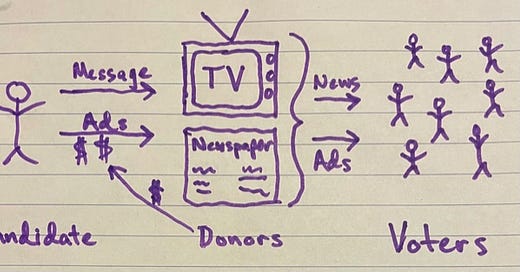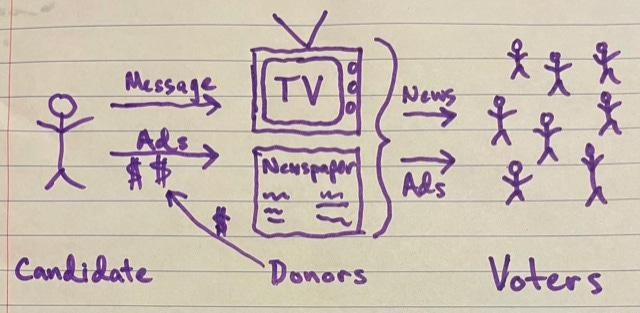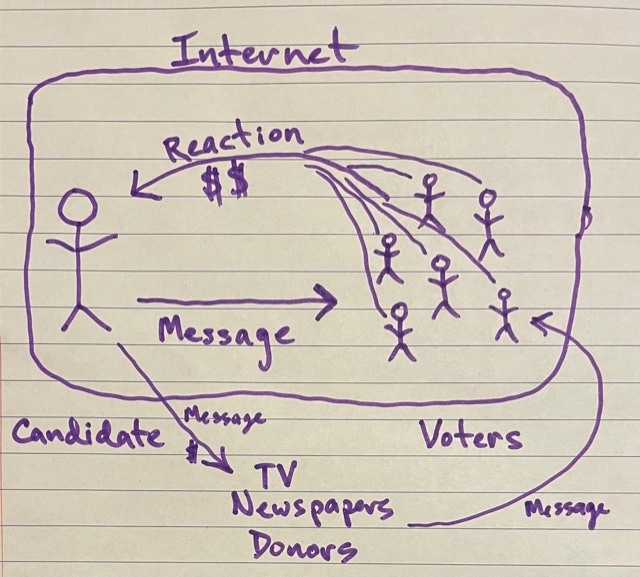Internet incentives and GOP authoritarianism
Our media ecosystem shapes our politics – and it always has
After years of growing authoritarianism within the Republican Party, for a moment following the January 6th insurrection it seemed like they might step back from the brink. Republican members of Congress were scared on 1/6, Fox News played it straight for a while, and seven Republican senators voted to convict Trump. But it didn’t take. Trumpists successfully pushed the Big Lie, and today authoritarian forces’ grip on the GOP is stronger than ever.
The anger, paranoia, violent rhetoric, and other signs of Republicans’ authoritarian turn are somewhat scattered, so for those who don’t follow politics closely it may be hard to see. Focus on it for a few minutes, though, and the GOP authoritarian mosaic comes into view.
The disparate signs of rising Republican authoritarianism include the following: [If you know these signs already or just want to skip to the analysis, do ctrl-F or ⌘-F for “London” and pick-up there.]
A systematic effort to replace good-faith Republican election officials with Trump loyalists.
Threats of violence against election officials.
The push to re-write the history of January 6th, including Tucker Carlson’s new special Patriot Purge, which claims it was a false flag.
More than two-thirds of Republicans telling pollsters in October 2021 that the 2020 election was stolen from Trump.
Steve Bannon saying, “We’re taking down the Biden regime,” and later going further: “We’re going on offense, and I think people just should stand by.”
NC Republican Lt. Governor Mark Robinson shouting, to raucous cheers at a recent rally, “The Christian patriots of this nation will own this nation and rule this nation!”
The virtually non-existent resistance from Republican elites to the authoritarianism in their ranks:
 "No Republican in leadership is willing to challenge the former president’s lies about the election. Every Republican in leadership is determined to bury the investigation of his coup attempt.... the story of a party that has become a platform for autocrats"Republicans in Congress: 1. oust Cheney for contradicting Trump's election lies 2. vote to block enforcement of subpoenas in the 1/6 investigation 3. increasingly defend Bannon and other 1/6 organizers A party sliding ever deeper into authoritarianism. https://t.co/PuzWCPn8uh
"No Republican in leadership is willing to challenge the former president’s lies about the election. Every Republican in leadership is determined to bury the investigation of his coup attempt.... the story of a party that has become a platform for autocrats"Republicans in Congress: 1. oust Cheney for contradicting Trump's election lies 2. vote to block enforcement of subpoenas in the 1/6 investigation 3. increasingly defend Bannon and other 1/6 organizers A party sliding ever deeper into authoritarianism. https://t.co/PuzWCPn8uh Will Saletan @saletan
Will Saletan @saletanThe sense among some right-wing gun owners that violence may be their only recourse in light of the supposedly stolen election1:
The blood-soaked rhetoric of some Republican leaders, and the permission structure it creates for those inclined toward violence.
A recent New York Times article called Menace Enters the Republican Mainstream explored the increasingly violence-inflected politics on the right:
Ten months after rioters attacked the United States Capitol on Jan. 6, and after four years of a president who often spoke in violent terms about his adversaries, right-wing Republicans are talking more openly and frequently about the use of force as justifiable in opposition to those who dislodged him from power.
…[E]ven at right-wing gatherings of the like-minded, there is a shared assumption that political confrontation could escalate into violence. At a Virginia rally last month for conservative supporters of Glenn Youngkin, the Republican candidate for governor, the urgency of a call to arms was conveyed right from the opening prayer. The speaker warned of the looming threat of “communist atheists.” “Heavenly Father, we come before you tonight,” said Joshua Pratt, a conservative activist. “Your children are in a battle, and we need your help.”
These developments are ominous, as political scientists and historians have been warning for years. But what’s most concerning are the incentives driving the trend. Brian Klaas, professor of global politics at University College London, described them in a recent twitter thread:
I'm growing increasingly pessimistic about the prospects for American democracy, because of one simple question: what could slow down the GOP march toward authoritarianism? I can come up with hundreds of reasons why the increasing authoritarian extremism in the Republican party/base is not just self-sustaining, but likely to accelerate. Primaries: Republicans who try to govern by consensus, compromise, or democratic principles rather than relentlessly kowtowing to autocratic Trumpian dogma now end up with primary challengers. Everyone knows this in the GOP, so even moderates become more extreme over time. ...[T]he rational strategy is to pander to the authoritarian extremists. (Social) Media breakout power. Two/three decades ago, someone like [Republican U.S. Representative Majorie Taylor Greene] would have been expelled from the GOP immediately. Now, she's a Republican breakout star on TV and on social media... Authoritarianism now comes with star power.
The state of play is quite bad but, as Klaas explains, it’s not the crux of the issue (emphasis mine):
And here's the problem: there are no countervailing forces. There's nothing that rewards being a sober moderate who believes in democracy. In fact, the people who try to defend democracy within the GOP become pariahs. Their careers die. So what happens? Even the moderates at heart start acting like zealots. [T]he authoritarian attempts to overturn the election have, if anything, become more mainstream, more of a litmus test for future GOP candidates. "Do you believe Trump won?" is an authoritarian loyalty test. Here's the bottom line: nobody has come up with a convincing explanation for how this authoritarian trend reverses itself. That's why, as someone who studies these dynamics for a living, I'm worried that the GOP is becoming irreversibly authoritarian.
A key question is whether these dynamics are temporary, perhaps the result of pandemic frustration, a disappointing election, and a uniquely destructive figure in Trump, or whether they will persist. Klaas only alludes to it, but as we’ll see the political incentives he describes pushing the GOP further toward authoritarianism are in part a byproduct of the internet media ecosystem, in particular the ways it differs from the old TV-and-newspapers system.2 Such a close connection to the internet media ecosystem – something relatively fixed – suggests the current GOP political dynamics are structural, making them harder to change.
Let’s take a closer look at the interplay between the media and political ecosystems.
In the second half of the 20th century, information was scarce. To know what was happening in the world you had to read the newspaper, watch TV news, or listen to the radio. There was no email, no Facebook, no Twitter, no texts, no cnn.com.3 The nature of the media influenced many aspects of life, including politics, where TV and newspapers sat between candidates and voters.4
To get attention in this environment, a political candidate had to either get covered by media outlets or run ads on TV. Ads required money, adding donors to the group of elites between candidates and voters. And candidates needed the support of the key issue and interest groups in their party.5 Most politicians shaped their strategies, agendas, and styles to succeed in this system, developing policy proposals and voting records calibrated in part to help them to win over these elite gate-keepers. And the gate-keepers tended to prefer uncontroversial, television-ready candidates likely to thrive in the system.
This newspaper-and-TV media ecosystem shaped what our politics looked like and how it worked for decades, from the 1940s through the 1990s. The politics it produced was, on the one hand, elite-driven, hierarchical, and exclusionary. On the other hand, it tended toward moderation and was generally a stabilizing force.
The internet arrived in a world where information was scarce and made it abundant. Today there are an infinite number of ways to know what’s going on. Television and newspapers still exist, but their power is mostly gone. That means today:
Candidates no longer need the favor of media elites to communicate with voters at scale.
Candidates no longer need big donors to raise big money.
Candidates no longer need party leaders for validation or voter mobilization.
All of what these elites used to be gate-keepers for, candidates can now get online.
The emergence of the internet transformed the incentives candidates face, as well as the skills and qualities rewarded in the political sphere. Being great at wooing donors, traditional media elites, and party leaders used to be critical, now it’s far less relevant. What matters instead is winning the attention war. Ambitious politicians today need to excel at grabbing voters’ attention and building a large audience of supporters online. The new political competition is build-your-own-audience, and audience size is power.6
This is where the problem starts, because in addition to tactics like mocking opponents and provoking outrage, Republicans have found that authoritarian rhetoric is effective in grabbing attention. So they offer a range of authoritarian messages, including ominous warnings of foreign invaders, military firepower displays, gun cosplay and implicit threats, stories of federal government tyranny, and other narratives that instill fear and justify violence. Based on my non-scientific research, this kind of message is still a relatively small proportion of even partisan Republicans’ Twitter content. But as long as the audience continues to respond to it, ambitious right-wingers will keep injecting authoritarian rhetoric into the public sphere. Where exactly that leads we can’t predict, but it’s a dangerous and destabilizing force.
(I want to note here that authoritarianism and adjacent topics like white power are massive, complex fields of knowledge that overlap with political science, psychology, history, sociology, and more, and there are questions in each of those domains we may explore here. But my primary aim, for now, is to show how the current trends in American politics are structural; for example, how our transformed media ecosystem rewards authoritarian rhetoric in a way that will tend to produce more of it. Questions like why some Republicans respond to such rhetoric are good ones that I may explore at some point, but for now are out-of-scope for Destabilized.)
Conclusion
Our internet media ecosystem is shaping today’s politics just like the old system influenced politics in its time. One of the results, an emergent phenomenon of the system, is authoritarian rhetoric on the right. The key insight is that this isn’t an aberration. That’s the mental shift we need to make. Because the attention war incentives created by the internet aren’t going to change anytime soon, our politics is likely to worsen considerably in the coming months and years.
Reflection and an Announcement
What does all this mean for us and how should we think about it? On a personal level, I’ve found the destabilization of America over the last several years to be disorienting, anxiety-inducing, and deeply painful. Even while seeing its many flaws, I’ve always loved my country – here’s my friend Pete (left) and me (right) at our friend’s house when we were 18, standing for the national anthem before a World Series game, hats over our hearts. (Why is my t-shirt so long? I don’t know! It was 1992.)
This pain I’ve experienced is the pain of loss. The loss of the idea of America that I grew up with and was a core part of my identity.
Our country, and probably most of the world, is in the early stages of a new era. The dynamics we’ve discussed, the incentives for anger, outrage, and division, will heavily influence politics in the future. Some degree of social unrest is likely – and we still haven’t discussed climate change yet.
It can all feel overwhelming sometimes. Of course it can.
But if we’re prudent, we shouldn’t assume we have the luxury of avoiding our anxiety by just focusing on other things. The destabilization we’re living through raises practical, high-stakes questions for every family:
How might first order climate impacts, like extreme weather, or second order effects, like the popping of the brittleness bubble, threaten your finances?
Could the value of your home be affected by climate or political upheaval?
How can you ruggedize your investment portfolio in light of climate change and societal instability?
How can you give your children both a positive outlook on life and realistic expectations for the future?
I’m going to be starting a consulting practice in December to support people thinking through and looking for answers to these kinds of questions. I’m excited to share more and launch my website in the weeks ahead. In the meantime, if you’re interested in scheduling a one-hour consultation you can reach me at ethanfletcher at gmail dot com.
Warmly,
Ethan
Notes:
https://www.washingtonpost.com/news/democracy-post/wp/2017/12/21/beware-of-president-trumps-nefarious-language-games/
In actuality, the 2020 election was fair. But you already know that.
The internet isn’t the sole cause of Republican authoritarianism – nothing so complex is mono-causal – but it is the sine qua non, the essential condition.
There were magazines and paper newsletters that came through the mail with significant time lags. There were also books and movies, many of which were impactful and received a lot of attention in the information-scarce environment. These other media had meaningful cultural power, but they were less influential than newspapers and TV news because they were less frequent, had smaller audiences, or both.
Shout-out to Ben Thompson of Stratechery for a number of these ideas, as well as this schematic drawing style.
I’m using the expansive definition of political parties described in the influential political science book, The Party Decides, which encompasses unions, churches, other issue and interest groups, etc. in addition to party committees and candidates.
Size isn’t the only audience metric that matters, of course. Level of commitment and willingness to extend online support to volunteering and donating also matters a lot.











I have been thinking about the historical lineage of mass communication for over a decade. It is wonderful to read your posts on this subject.